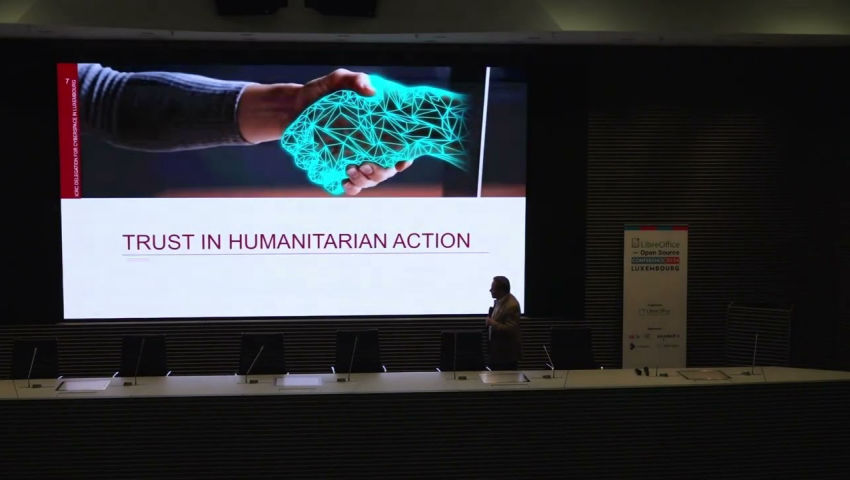- 220 Posts
- 729 Comments

 14·2 months ago
14·2 months agoAs for my own opinion - I fully agree not to ditch it right now, unless you are super privacy-concerned.
If you are, and if you think Mozilla is a lost cause, then please, as a community, get together and organise a body that is financially and legally able to carry a FLOSS browser with its own web engine. Not saying this to be snarky or as a gotcha, I am just somewhat irritated by some people saying to ditch Firefox to then say the alternative is a Firefox fork with a team way too small to handle what is needed to maintain a browser project going into the future, if they couldn’t build on the upstream code.
Because if you don’t organise such an organisation, including eventually financially giving to that group if you have the resources, Mozilla will remain in the ambivalent position of trying to balance markets and ideals, with less and less of a bargaining chip on the ‘ideals’ side - and the web will continue to be further and further dominated by non-free software trying to make web standards more proprietary.

I mean, national weapons proliferation? That’s really not a concern with modern reactor tech, and they should know that. The article ignores the last 50 years of advancement in reactor design to present their arguments, and that really undermines their credibility.
The problem is: In real life, most nations want weapons potential as an added bonus to their expensive civil nuclear programs. This connects to the “Takes too long to build” and “Expensive” points.
Nuclear waste is also something, that even though ideas exist in spades, no one seems to have been able to solve. So I wonder: What are the real world hurdles, that have prevented all the talk of “we just need breeder reactors” or something similar, that I have been hearing for many years now, to manifest? Is the tech maybe not as easily implemented as thought? Is the cost/reward ratio too bad, so it would again connect to the expensive point?
Thing is: I am not fundamentally against Nuclear as part of a power mix, with climate change being the most pressing reality. But I think it’s often presented as better as it is in the real world by people that are highly intelligent and knowledgeable in the basic physics and theoretical engineering parts - but then usually don’t have answers for why, then, even states that don’t have large anti-nuclear movements don’t use it often, in real world circumstances.
 113·2 months ago
113·2 months agoI really don’t think he works for “Russia” per se, he works for his clique of grifters and is genuinely deluded into believing Russia and Putin are stronger and more capable than they are - and better suited to benefit him personally. In the end, he works for himself and his close circle of capitalists, already speculating on a recession.

 5·2 months ago
5·2 months agoNothing to lose but your chains, you say 🤔

 21·2 months ago
21·2 months agoI think you might be onto something there, still remains in favour of individual capitalists against national capital - and is usually something, the state is supposed to prevent (it’s jobs in capitalism are mostly preventing class conflict between bourgeoisie and proletariat just as much as conflict between individual capitalists hurting the economy at large).
But this now feels like 19th century economics from before understanding the nature of crises, and 19th century “sphere of influence” geopolitics all in one.
Here’s hoping they end up shooting themselves in the foot by underestimating the consequences of their actions.

 56·2 months ago
56·2 months agoAlexander S. sei mehrfach vorbestraft. Und: „2018 sei gegen ihn wegen Verdachts des Verwendens von Kennzeichen verfassungswidriger Organisationen aus dem rechten Spektrum ermittelt worden. Zudem habe er online verfassungsfeindliche Inhalte geteilt.“ Die Polizei geht hingegen nicht von einem politischen Motiv aus.
Absolut lächerlich wäre es, wenn es nicht so traurig wäre.

 46·2 months ago
46·2 months agoThe Nixon-era Richardson Waiver came about amid a push for more public engagement, with the waiver acting essentially as a workaround to amending the APA’s exemptions. As Richard Brady, the assistant secretary for administration, wrote in the Federal Register at the time, implementing the Richardson Waiver “should result in greater participation by the public in the formulation of this Department’s rules and regulations.”
“The public benefit from such participation should outweigh any administrative inconvenience or delay which may result from use of the APA procedures in the five exempt categories,” Brady wrote. The waiver also noted that the Health Department should use the “good cause” exception “sparingly.”
Kennedy’s new policy rescinds the Richardson Waiver entirely. He writes in stark contrast: “The extra-statutory obligations of the Richardson Waiver impose costs on the Department and the public, are contrary to the efficient operation of the Department, and impede the Department’s flexibility to adapt quickly to legal and policy mandates.”
So, just to make this clear, they didn’t just not really implement their fabled transparency, they also walked back on the control mechanisms that were already in place.
That’s a really cool timelapse! Makes me wish they had included if it’s available for use with a free license :D

 2·2 months ago
2·2 months agoHa, yeah, I’m usually working on something on one screen and having a browser open on the second one with some kind of video or something. Then, whenever my ADHD causes me to lose focus on work, I check the feed for interesting stuff to promote. It works well, and I’d be easily distracted one way or the other.

 29·2 months ago
29·2 months agoIt’s fascinating, because the people behind him are genuine grifters and/or delusional ideologues, he can’t even make proper politics in the interest of capitalists. (Just in the interests of some individual capitalists, against the interests of national capital accumulation).

 5·2 months ago
5·2 months agoArticle without paywall:

 9·2 months ago
9·2 months agoWarum nicht? Soll man jetzt auch noch kuschen und alles abnicken und nicht mit benutzen, dass man mal eine konstruktive Verhandlungsposition hat? Entweder Schuldenbremse für alles weg, oder nichts. Keine Sondervermögen. Das ist die Verhandlungsposition, wenn Merz eine Mehrheit möchte. Halte ich jetzt nicht für eine Position ohne Rückhalt (oder Rückgrat).

 1·2 months ago
1·2 months agoC*U vielleicht auch bald für Rechts und “heute dies, morgen das, übermorgen was ganz anderes”

 4·2 months ago
4·2 months agoEin weiteres Argument: Selbst wenn man Tricksereien und “nicht wirklich”-Nachfolgeorganisationen erwartet, bei den vielen Egos, die so eine Partei hat, ist durchaus zu erwarten, dass es nicht eine, sondern viele “ich mache es diesmal richtig”-Egoprojekte geben würde. Die Organisationsfähigkeit ist also stark reduziert.

 28·2 months ago
28·2 months agoRamelow kritisiert, dass Kriminalität ausschließlich vor dem Hintergrund der Herkunft der Täter diskutiert werde. Die zahlreichen Femizide würden „nicht mal ansatzweise so hart diskutiert wie eine Kriminalitätstat, wenn es ein ausländischer Geburtsort ist“.
Dirk Müller sagt daraufhin: „Demnach ist die Mehrheit, Herr Ramelow, ein bisschen blöd.“
Ich habe großen Respekt davor, dass es Ramelow schafft, an dieser Stelle nicht zu sagen, dass demnach doch zuallererst der Moderator blöd ist und nicht nur ein bisschen.
Das ist was, was bei mir öfters das Blut zum Kochen bringt - die Menschen, die alle Probleme darauf schieben, “dass die Menschen halt so dumm sind.” Insbesondere, wenn man Journalist ist, und damit selbst in der Verantwortung steht, wie man den öffentlichen Diskurs formt.
Ich hab in meinem Leben viele Langzeitarbeitslosenmaßnahmen, Kliniken und Psychiatrien von innen gesehen, aber durch Freunde auch öfters mal den oberen Mittelstand hinter verschlossenen Partytüren. Also habe ich von verarmten Menschen mit Lernbehinderungen bis hin zum wohlabenderen IT-ler viel mitbekommen - und immer wieder höre ich bei liberalen, oberen Mittelständlern ein Jammern über “Dummheit”, während dieselben Menschen kein hinreichendes Modell haben, zur Erklärung, warum der Diskurs so verroht und “dumm” ist. Dann wird so pop-Science über Massenpsychologie zitiert, manchmal noch direkt Unga-Bunga-Mythen über Frauen, die Beeren sammeln und dem Steinzeitmann, der das Mammutsteak grillt, “die menschliche Natur” beschworen, ohne dass das auch nur ansatzweise wissenschaftlich oder nur philosophisch unterfütter wird, und so weiter und so fort. Kompletter Schwachsinn, häufig. Nun gibt es das durchaus auch in unteren, ärmeren Schichten, ohne Zweifel - aber dort habe ich es zumindest seltener, mit so einer Hochnäsigkeit und kompletter Verneinung eigener Verantwortung erlebt.
Gleichzeitig wird dann auch schön selektiv das demokratische Prinzip und die Verfassung genommen. Bei so einer Diskussion? Ist doch wichtig, dass die Mehrheit der Gesellschaft gehört wird! (Die u.A. durch den Stil der Berichterstattung zu einer Mehrheit geformt wurde.) Aber bei Fragen von Armut und Sexismus, die auch Mehrheiten angehen? Ja, das ist ja nicht zurzeit im Fokus der allgemeinen Diskussionen. Und dann muss ja auch trotzdem manchmal auf Wirtschaftsexperten und so gehört werden, gegen die Mehrheitsmeinungen, ansonsten hat man die Diktatur der Mehrheit, das ist ja nicht im allgemeinen Interesse, nicht? Menschenwürde ist im Übrigen auch, wenn Arbeitslose nur genau so viel zum gerade so überleben bekommen, denn ansonsten wird die Würde der Verdienenden angegriffen, sie werden ja geradezu beraubt!
Und materialistische Erklärungsmodelle, historische Perspektiven usw. sind in der Postmoderne dann auch nicht mehr gern gesehen. Der Diskurs ist schwachsinnig, weil der Presse in Folge der materiellen Dynamiken Profite von Sensationsklicks wichtiger werden, als Aufklärung? Das Publikum ist selbst schuld, dass sie so dumme Nachrichten wollen, wir geben ihnen doch nur was nachgefragt wird! Dass das Bewusstsein der Menschen durch die Art von Produktion, Verteilung und allgemeiner gesagt, unserer Interaktion mit der materiellen Realität, geformt wird, das wird höchstens mal als ein “ja ja, okay, aber something something human nature!” erwähnt.
Alternativ kann man natürlich in der eigenen Deutschlandfunk-Morgeninterview-Routine verbleiben und den linken Politiker ein bisschen anpöbeln: Polit-Entertainment am Morgen, Adrenalinschub inklusive.
Traurig, und der Journalist hat wahrscheinlich auch die Selbst-Reflektionsfähigkeit von Vantablack oder so. Die, und Fähigkeit zur emotionalen Distanz, finde ich deutlich wichtiger zu thematisieren, als “Dummheit”. Denn “Dumme” habe ich viele getroffen im Leben, inklusive Menschen mit Lernbehinderungen, und oft waren diese besser in ihrer Meinungsfindung, als so mancher mit hohem IQ und geringem Erfahrungsschatz plus einer Prise Arroganz.

 4·2 months ago
4·2 months agoI’m sorry, when I made this account there were basically no other instances, and now I don’t want to move and lose the early adopter bragging rights

 10·2 months ago
10·2 months agoHa, ja, volle Solidarität. Ich bin in der Position Außenpolitik auch nicht auf Parteilinie, aber für mich war ausschlaggebender, dass ich am Monatsende wegen unerwarteter Sonderkosten, Behinderung und Erwerbsminderungsrente auf Grundsicherungsniveau mal wieder weniger als nen Euro hatte. Das war für mich dann schon irgendwo entscheidender.























Ich würde mich ja auch damit zufriedengeben, wenn ermittelt wird in die Richtung, und dann festgestellt: Okay, gab keine politische Motivation für jetzt genau diese Tat. Aber das wurde ja sofort ausgeschlossen.
Und selbst dann: Die rechte Szene verbreitet generell eine Kultur, die Menschenleben den Wert abspricht, und solche Taten selbst in einem nicht direkt politischem Kontext vereinfacht. Wenn man das für den Islamismus so dauerhaft wiederholen kann, dann doch bitte auch hier.